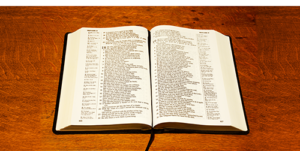Dr. McKellar’s Lesson for February 16, 2025
Series on God Sustains His People
A Full Atonement Forecast
Leviticus 16:1-34
1. God’s Sobering Presence (1-5)
• experience of Nadab and Abihu (Lev. 10)
• place of God’s presence
• preparation for entering God’s presence
2. Access into God’s Presence (6-28)
• blood atonement and ritual removal (scapegoat) (6-10)
• purification by blood (11-19)
• purification by removal (20-28)
3. Preparation of God’s People (29-34)
• contrition
• cessation
• cleansing
4. So What?
• Note the NT connections to Christ: Rom. 3:25, Heb. 13:12, 9:12-14; 26-28, 2 Cor. 5:21
• Because Jesus fulfills every detail forecasted, relish His finished work through reflection and repentance.
• “Guilty, vile, and helpless we; Spotless Lamb of God was He; ‘Full atonement!’ can it be? Hallelujah! What a Savior!” (P. Bliss)
Dr. McKellar’s Lesson for February 9, 2025
Series on God Sustains His People
Accepted by God
Leviticus 1:1-17
1. Review/Context
• golden calf (Ex. 32) and the necessity of reconciliation
• tabernacle: the word revealed and worship through sacrifice
• the LORD called…saying
• Lev. 1: focus on burnt offerings
2. Entrance Allowed
• basis of acceptance of the worshiper
• no one prohibited from approaching
• requirement for sacrificial victim: blameless/without defect
3. Procedure Specified
• blood and body of a substitute
• identification of worshiper with the sacrificial victim
• sacrifice “surrendered” and wrath of God satisfied
• atoning sacrifice
4. Acceptance Indicated
• sacrifice consumed by fire on altar
• smell/aroma of sacrifice: pleasing to the LORD
5. So What?
• Those who approach God based on atoning sacrifice may experience acceptance with Him forever.
• Note the NT connections: Mt. 20:28; Rom. 3:25; Eph. 5:27: 1Pet. 1:19, 2:22
• “Sacrifice is at the heart of all true worship.” (Ross)
• “What language shall I borrow…?” (Bernard of Clairvaux, “O Sacred Head Now Wounded”)
Dr. McKellar’s Lesson for February 2, 2025
Series on God Sustains His People
A Case of Post-Calf Grace
Exodus 35:30-36:7
1. Assessing the Building
• a dwelling designed by the LORD
• constructed to communicate
• attention to the LORD’S instruction
• “It is possible to believe that the Bible is the inerrant Word of God—yet neglect it and effectually repudiate it just because we think that it is not great enough for today’s tasks.” (Boice)
2. Embracing the Beauty
• Why not just throw a few boards together?
• empowered artistry: Bezalel and Oholiab
• objective standard of excellence
3. Experiencing the Blessing
• voluntary offering: an “art” form in itself
• Before you render, you receive. (35:1-3)
• time, talent and treasure (35:4-29)
• The people were restrained!
4. So What?
• When you are instructed by God’s principles and inspired by His presence, you pursue lavish participation in His work.
• from the portable to the permanent (1 Pet. 2:5; Eph. 2:21; 1 Cor. 6:19)
• Breathtaking “Beauty” has visited us. (John 1:14)
• Your use of His resources should reflect the depth of His rescue. (Kirk, “Our Best”)
• divine artistry to the glory of God!
Dr. McKellar’s Lesson for January 12, 2025
Series on God Sustains His People
Grace-Based Commandments
Exodus 20:1-17
1. Confirm the Context of Grace 1-2
• gracious address
• gracious activity
• torah: instruction
2. Consider the Foundational Command 3
• first commandment
• “before My face”
• creation and covenantal claims
• sets the stage for the vertical/horizontal
3. Make the Connection to Christ
• SOM (Matt. 5:17-20)
• RYR (Matt. 19:17)
4. So What?
• Because the LORD communicates His commands in a context of redeeming grace, obey them enthusiastically!
• Dismiss the notion that idolatry is only an ancient issue.
• Reflect on John 14:15 and 1 John 5:3.
• “Trust and Obey” (John Sammis)
Dr. McKellar’s Lesson for December 15, 2024
Christmas Series
Forever Is a Mighty Long Time!
2 Samuel 7:12-17
1. Forecast 2 Sam. 7:12-17
• David wants to build a house
• David is going to die
• the element of an extended telescope
• promise of a king and a kingdom that last forever (Isa. 9:6-7)
2. Fulfillment Luke 1:31-33
• an angelic announcement to Mary
• clued in to the identity of Jesus
• God Himself comes as King (Acts 2:29-35, John 1:1,14)
• and He shall reign forever and ever (Rev. 11:15; 22:16)
3. So What?
• Because God keeps His promises forever, entrust your destiny to His designated King.
• “The King of Kings salvation brings; let loving hearts enthrone Him.” ( Dix, “What Child Is This?”)
• “Joy to the world! The Lord is come. Let earth receive her King.” (Watts, “Joy to the World”)
• “Man’s Maker was made man, that He, Ruler of the stars, might nurse at His mother’s breast; that the Bread might hunger, the Fountain thirst, the Light sleep, the Way be tired on its journey; that the Truth might be accused of false witness, the Teacher be beaten with whips, the Foundation be suspended on wood; that Strength might grow weak; that the Healer might be wounded; that Life might die.” (Augustine, 354-430).
Dr. McKellar’s Lesson for December 8, 2024
Christmas Series
A Greater Deliverance
Exodus 12:11-13
1. The Experience of Moses (Ex. 12:11-13)
• cries of bondage
• call of a deliverer
• climactic plague
• application of blood
2. The Exposition of Peter (1 Pet. 1:17-21)
• immeasurable valuation
• eternal origination
• divine certification
• timeless indication
3. So What?
• Because of the Lord’s merciful and ultimate deliverance through Jesus, rely and rejoice this Christmas.
• “Creator of the stars of night, your people’s everlasting light, Jesu, Redeemer, save us all, and hear your servants when they call.” (Neale, “Creator of the Stars at Night”)
• “Born thy people to deliver, born a child and yet a king. Born to reign in us forever, now thy gracious kingdom bring.” (Wesley, “Come, Thou Long Expected Jesus”)
Dr. McKellar’s Lesson for December 1, 2024
Christmas Series
The Gospel Preached Beforehand
Genesis 17:3-8
1. Indication Gen. 17:3-8
• name change: “exalted father” to “father of a multitude”
• from looking back to looking forward
• verification that seems to lag grievously
2. Inclusion Rom. 4:8-25
• Abraham’s justification (Gen. 15:6; 17:23-27)
• sheer grace for both Jew and Gentile
• fully persuaded
3. Anticipation Gal. 3:8
• the old, old story (Gen. 12:1-3; 15:5)
• the good news of forgiveness and eternal life (Gen. 22:8, 5)
• “…so let’s all praise the Lord!” (L. Loeb)
4. So What?
• Because the symphony of Scripture reaches its ultimate crescendo in Christ, worship His majesty and magnificence this Christmas.
• Treasure the accuracy of God’s revelation regarding the advent of atoning and resurrecting power through the person and work of Jesus (Gal. 4:4).
• “O tell me the story that never grows old, the story of One whom the prophets foretold; The horn of salvation, the Sceptre and Star, the Light in the darkness they saw from afar. It never grows old, it never grows old. The story of Jesus will never grow old!” (J. Gray)
Dr. McKellar’s Lesson for November 24, 2024
Thanksgiving Message
A Psalm for Thanksgiving 2024
Psalms 100:1-5
1. Background
• summit/climactic psalm of a series focused on worship (Psalms 95-100)
• the principle of engaged and informed worship
2. Prescription 1-2
• as wide as the world
• joyfully, gladly, willingly (Rom. 12:1)
3. Perspective 3
• prerequisite for praise
• knowing who God is, who we are, what status we enjoy (1 Cor. 6:19-20)
4. Prescription 4
• backdrop of Exodus 25-31
• entering, thanking, blessing (Heb. 10:19-25, Rev. 21:27)
5. Perspective 5
• pairing of goodness and mercy (Psa. 23:6)
• faithfulness without an expiration date
6. So What?
• Because of what you know about God, feel and express thanks to Him.
• On Thursday, celebrate God’s initiative, activity and invitation.
• Cultivate a preoccupation with God’s preferences.
• “For why? The Lord our God is good, His mercy is forever sure; His truth at all times firmly stood, and shall from age to age endure.” (W. Kethe)
Dr. McKellar’s Lesson for November 17, 2024
We Have an Altar
Hebrews 13:9-16
Series: Highlights in Hebrews
1. Context
• the unchanging character of Jesus and Christian living (13:1-8)
• The revolutionary sacrifice of Jesus for you demands a radical surrender from you.
2. Do Not Go on Being Carried Away (9)
• bridge back to 13:8
• a focus on the favor of God rather than the food of man
3. Let Us Keep on Going to Him (10-14)
• feasting at a better altar
• outside the camp
4. Let Us Offer a Sacrifice of Praise (15)
• fruit of our lips
5. Do Not Be Forgetful (16)
• sacrifices of “the good” and of “sharing”
6. So What?
• Distinguish fleeting trivialities from eternal realities (Maclaren).
• Recognize the distinct connection between creed and deed.
• “Believing, we rejoice to see the curse remove; We bless the Lamb with cheerful voice, and sing His bleeding love.” (Watts)
Dr. McKellar’s Lesson for November 10, 2024
All Because of Jesus
Hebrews 12:18-29
Series: Highlights in Hebrews
1. Context
• connection to the warning of 12:14-17
• no turning back: a contrast between two mountains
2. Reflect on the Terror of Sinai 18-21
• material indicators of God’s holy presence (Ex. 19:12-13)
• terrified response of the people and Moses
3. Recognize the Joy of Zion 22-24
• Zion: from booming threat to blessed assurance
• summary of its superiority: celebration, registration, authorization, completion, mediation, revelation (Num. 3:40-43)
4. Put the Truth to Work 25-29
• See to it: a warning based on a lesser/greater perspective (Hag. 2:6)
• Let us be grateful
• Let us offer worship (Rom. 12:1, Deut. 4:24)
• Since you are receiving a kingdom that can’t be shaken, express gratitude and offer worship to God.
• Encouragement from the saints (Heb. 11): “Give us the wings of faith to rise within the veil, and see the saints above, how great their joys, how bright their glories be. We ask them whence their victory came: they, with united breath, ascribe their conquest to the Lamb, their triumph to his death. They marked the footsteps that he trod, his zeal inspired their breast, and, following their incarnate God, possess the promised rest.” (Watts, “Give Us the Wings of Faith”)


